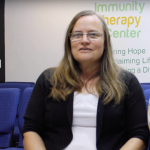Medically Reviewed by: pdm
Our Editorial Policy
Updated on: noviembre 16, 2019
About Appendix Cancer
The appendix is a 4-inch-long sac attached to the first section of the large intestine. Although it is considered part of the gastrointestinal tract, the appendix is not considered to serve any important function in the body.
In the case of appendix cancer, healthy cells in the appendix begin to grow out of control, forming large cysts or tumors. This form of cancer is very rare, accounting for only about 0.5 percent of all solid tumors in the gastrointestinal tract. The most common type of appendix cancer in patients is known as a neuroendocrine tumor (NET). These make up about half of all appendix cancer diagnoses and are most common in women in their 40s. Neuroendocrine tumors form in cells responsible for hormone production and usually appear after the appendix has been removed.
Causes and risk factors
Appendix cancer is the result of genetic mutations that cause cancer cells in the appendix to multiply uncontrollably, forming cysts and tumors that can spread to other parts of the body. The specific cause of this genetic mutation is unknown. There may be a hereditary element, as a family history of appendix cancer is known to increase the chances of developing this type of cancer.
Smoking is also a possible risk factor. Smokers have a higher risk of developing appendix cancer than non-smokers. Also, certain health conditions can increase the risk of appendix cancer. This mainly comes down to conditions that affect the stomach’s ability to produce digestive acids, including:
- Atrophic gastritis (chronic inflammation of the stomach lining)
- Pernicious anemia (vitamin B12 deficiencies)
- Zollinger-Ellison syndrome
Early detection, diagnosis, and staging
Appendix cancer usually does not present noticeable symptoms until it has progressed to other stages. Symptoms can also vary from person to person. Common signs and symptoms of this disease include:
- Appendicitis
- Loss of appetite
- Ovarian masses
- Pain in the lower right area of the abdomen
- Sudden changes in bowel movements
- Swelling
- Indigestion
- Vomiting
- Acid reflux
- Hernias
Doctors can use blood and urine tests to determine the extent of the disease and the effectiveness of treatments. The doctor may also use a wide range of imaging tests, including MRIs, ultrasounds, and CT scans as part of the diagnostic process.
With diagnosis comes staging. The staging process (knowing what stage the cancer is in) is important in developing treatment plans and evaluating your response to treatment. The stage of appendix cancer depends mainly on the size of the tumor and its possible spread to other parts of the body. The stages of appendix cancer are defined as:
- Localized (the tumor is located in the appendix, colon, rectum, small intestine, or large intestine)
- Regional (cancer has spread to nearby lymph nodes)
- Metastatic (cancer has spread to other parts of the body)
Carcinomas and carcinoid tumors are classified differently: from stage 0 to stage IV with several subcategories. Generally, this classification is based on whether the primary tumor can be removed by surgery and whether it has spread to other parts of the body.
About Alternative / Natural Treatment for Appendix Cancer
Traditional treatments for appendix cancer usually include chemotherapy, radiation therapy, or some type of surgery (usually an appendectomy). The effectiveness of cancer treatment with these treatments can vary, but many of the traditional cancer treatments have various side effects that can leave you physically exhausted from an already weakened immune system.
This is where alternative treatments come in. They offer natural methods to facilitate recovery while mitigating any possible side effects of traditional treatments.
The Immunity Therapy Center offers a wide range of alternative and natural treatments for appendix cancer. Our team is dedicated to developing personalized treatment plans based on your health and cancer progression. Above all, we treat you as a person and want to build a positive relationship through every step of the treatment process. For more information or to schedule a free consultation, contact us today.
Terapias que usamosAt Immunity Therapy Center, our goal is to provide objective, updated, and research-based information on all health-related topics. This article is based on scientific research and/or other scientific articles. All information has been fact-checked and reviewed by Dr. Carlos Bautista, a Board Certified Medical Doctor at Immunity Therapy Center. All information published on the site must undergo an extensive review process to ensure accuracy. This article contains trusted sources with all references hyperlinked for the reader's visibility.
Cuidado personalizado para el cuerpo y la mente
Discuta su plan de tratamiento alternativo personalizado con nuestro equipo hoy mismo.
Escuche a nuestros pacientes
Descubra por qué Immunity Therapy Center es un nombre de confianza en el turismo médico y los centros de tratamiento del cáncer en México.
FAQ's
Select Topic:- Diseases and Treatments
- Our Mexico-based Center and Team
- Patient Expectations and Experiences
- Costs and Travel Arrangements
Diseases and Treatments
Many patients come to us after going through several rounds of chemotherapy, radiation, surgery, and other conventional cancer treatments. Our alternative cancer therapy programs are often more effective and have fewer side effects for our patients than those treatments.
Many of our alternative therapies are designed to boost your immune system so it is better able to recognize, fight, and kill cancer cells without the need of chemotherapy and radiation.
Learn more about our alternative cancer therapies.
We offer the following alternative therapies for naturally treating cancer and other diseases:
- Whole Body Hyperthermia
- Localized Hyperthermia
- Sonodynamic Therapy
- Laser Cancer Therapy
- Insulin Potentiation Therapy (IPT)
- Rife Therapy
- Intravenous Solutions (IV Cancer Therapy)
- Enzymatic Cancer Therapy
- Oxygen Cancer Therapy
- Vitamin and Mineral Supplements
- Laetrile Therapy (Vitamin B17)
- Specific Transfer Factor Vaccine Against Cancer
- Regenerative Cell Cancer Therapy (Peptide Treatment)
- Intraperitoneal Perfusion Hyperthermia
- Viral Anticancer Vaccine
We emphasize immunotherapy cancer therapy, which includes different therapies designed to boost and strengthen your immune system so it can recognize, fight, and kill cancer cells on its own. Immunity Therapy Center is unique because we are able to offer both alternative and conventional treatments in customized, individualized programs.
Learn more about our alternative cancer therapies.
Most treatment programs are completed in three weeks. Depending on the stage and condition of your disease, you may require a treatment program of six weeks or more.
Learn more about our treatment process.
Dr. Bautista will evaluate you once your program is complete and recommend follow-up care. Depending on your situation, this may include alternative therapies, medications, and natural supplements you can take at home, or returning to our center in three to six months for further treatment.
Learn more about our alternative cancer treatment process.
Our Mexico-based Center and Team
We are in Tijuana, a major metropolitan city in Baja California, Mexico, right across the border from San Diego, California. Learn more about our location and our facility.
Dr. Bautista received formal medical training from Baja California State University in Mexico. He also holds a Masters in Nutrition from the same university. He has worked as a Director for alternative medicine hospitals. Early in his career, Dr. Bautista became interested in alternative cancer therapy and treatments and has studied alternative treatments extensively around the world.
Learn more about Dr. Bautista.
Patient Expectations and Experiences
Our alternative, natural treatment programs are completely customized and different for each person. Dr. Bautista personally evaluates each patient to design a holistic, alternative therapy program based on specific needs. He meets with every patient, every day, to monitor and evaluate his or her treatment and progress. This allows him to make immediate adjustments to treatments as needed.
Our entire team strives to make your treatment program a positive experience.
Learn more about our treatment process and listen to some of our patients’ experiences at Immunity Therapy Center.
We treat a wide range of patients with a variety of cancer types from stage 1 to stage 4, as well as patients with different autoimmune diseases, chronic degenerative diseases, and infectious diseases. All these factors, as well as previous treatments and medical history, impact individual success and survival rates.
Dr. Bautista will discuss your condition and chance of success during your initial consultation. Many of our patients do go into remission and see enhanced quality of life following treatment.
Learn more about survival and success rates.
We highly encourage bringing a friend or family member. Having strong support is an important factor in your treatment success.
Dr. Bautista and our nutritionist will discuss your diet with you during your cancer treatment. Your specific dietary needs may vary, but we encourage you to eat a balanced, organic diet as much as possible.
We have an onsite chef that prepares organic, healthy meals at our center.
Costs and Travel Arrangements
A typical three-week treatment program costs $18,995USD, and includes all therapies, diagnostics, and a healthy, organic, breakfast and lunch (+2 juices/smoothies) Monday – Saturday. Room and other board, travel costs, surgeries, and blood transfusions are not included. Some very specific therapies may not be included. Depending on your stage and condition, you may need six weeks of treatment or more.
There are options to help you cover the cost of your alternative cancer treatment at Immunity Therapy Center. Visit our Payment & Financing page to learn more.
Unfortunately, most major health insurance providers do not cover alternative treatments, but there are other options to help you cover the cost of your treatment. Visit our Payment & Financing page to learn more.
We accept major credit cards (some fees may apply), personal and cashier’s checks, wire transfers, and cash. You can also easily PAY ONLINE.
Airfare is not included in the program cost; however, transfers to and from the airport (Tijuana or San Diego) and transportation between our center and your hotel are included.
You may fly into Tijuana, Mexico or San Diego, California. Wewill make arrangements to meet and pick you up at either airport. We are only 25 minutes from the San Diego International Airport. You may also drive to the center. When you schedule your treatment, we will provide detailed driving directions.
Learn more about making travel arrangements to our facility in Tijuana, Mexico.
If you are undergoing outpatient treatment, you will need to stay in a local hotel or other lodging option during your treatment. We are located near several quality hotels in Tijuana, and have arranged special rates for our patients.
Learn more about recommended hotels and accommodations on our Travel Information page.
FAQ's
Select Topic:- Diseases and Treatments
- Our Mexico-based Center and Team
- Patient Expectations and Experiences
- Costs and Travel Arrangements
Diseases and Treatments
Many patients come to us after going through several rounds of chemotherapy, radiation, surgery, and other conventional cancer treatments. Our alternative cancer therapy programs are often more effective and have fewer side effects for our patients than those treatments.
Many of our alternative therapies are designed to boost your immune system so it is better able to recognize, fight, and kill cancer cells without the need of chemotherapy and radiation.
Learn more about our alternative cancer therapies.
We offer the following alternative therapies for naturally treating cancer and other diseases:
- Whole Body Hyperthermia
- Localized Hyperthermia
- Sonodynamic Therapy
- Laser Cancer Therapy
- Insulin Potentiation Therapy (IPT)
- Rife Therapy
- Intravenous Solutions (IV Cancer Therapy)
- Enzymatic Cancer Therapy
- Oxygen Cancer Therapy
- Vitamin and Mineral Supplements
- Laetrile Therapy (Vitamin B17)
- Specific Transfer Factor Vaccine Against Cancer
- Regenerative Cell Cancer Therapy (Peptide Treatment)
- Intraperitoneal Perfusion Hyperthermia
- Viral Anticancer Vaccine
We emphasize immunotherapy cancer therapy, which includes different therapies designed to boost and strengthen your immune system so it can recognize, fight, and kill cancer cells on its own. Immunity Therapy Center is unique because we are able to offer both alternative and conventional treatments in customized, individualized programs.
Learn more about our alternative cancer therapies.
Most treatment programs are completed in three weeks. Depending on the stage and condition of your disease, you may require a treatment program of six weeks or more.
Learn more about our treatment process.
Dr. Bautista will evaluate you once your program is complete and recommend follow-up care. Depending on your situation, this may include alternative therapies, medications, and natural supplements you can take at home, or returning to our center in three to six months for further treatment.
Learn more about our alternative cancer treatment process.
Our Mexico-based Center and Team
We are in Tijuana, a major metropolitan city in Baja California, Mexico, right across the border from San Diego, California. Learn more about our location and our facility.
Dr. Bautista received formal medical training from Baja California State University in Mexico. He also holds a Masters in Nutrition from the same university. He has worked as a Director for alternative medicine hospitals. Early in his career, Dr. Bautista became interested in alternative cancer therapy and treatments and has studied alternative treatments extensively around the world.
Learn more about Dr. Bautista.
Patient Expectations and Experiences
Our alternative, natural treatment programs are completely customized and different for each person. Dr. Bautista personally evaluates each patient to design a holistic, alternative therapy program based on specific needs. He meets with every patient, every day, to monitor and evaluate his or her treatment and progress. This allows him to make immediate adjustments to treatments as needed.
Our entire team strives to make your treatment program a positive experience.
Learn more about our treatment process and listen to some of our patients’ experiences at Immunity Therapy Center.
We treat a wide range of patients with a variety of cancer types from stage 1 to stage 4, as well as patients with different autoimmune diseases, chronic degenerative diseases, and infectious diseases. All these factors, as well as previous treatments and medical history, impact individual success and survival rates.
Dr. Bautista will discuss your condition and chance of success during your initial consultation. Many of our patients do go into remission and see enhanced quality of life following treatment.
Learn more about survival and success rates.
We highly encourage bringing a friend or family member. Having strong support is an important factor in your treatment success.
Dr. Bautista and our nutritionist will discuss your diet with you during your cancer treatment. Your specific dietary needs may vary, but we encourage you to eat a balanced, organic diet as much as possible.
We have an onsite chef that prepares organic, healthy meals at our center.
Costs and Travel Arrangements
A typical three-week treatment program costs $18,995USD, and includes all therapies, diagnostics, and a healthy, organic, breakfast and lunch (+2 juices/smoothies) Monday – Saturday. Room and other board, travel costs, surgeries, and blood transfusions are not included. Some very specific therapies may not be included. Depending on your stage and condition, you may need six weeks of treatment or more.
There are options to help you cover the cost of your alternative cancer treatment at Immunity Therapy Center. Visit our Payment & Financing page to learn more.
Unfortunately, most major health insurance providers do not cover alternative treatments, but there are other options to help you cover the cost of your treatment. Visit our Payment & Financing page to learn more.
We accept major credit cards (some fees may apply), personal and cashier’s checks, wire transfers, and cash. You can also easily PAY ONLINE.
Airfare is not included in the program cost; however, transfers to and from the airport (Tijuana or San Diego) and transportation between our center and your hotel are included.
You may fly into Tijuana, Mexico or San Diego, California. Wewill make arrangements to meet and pick you up at either airport. We are only 25 minutes from the San Diego International Airport. You may also drive to the center. When you schedule your treatment, we will provide detailed driving directions.
Learn more about making travel arrangements to our facility in Tijuana, Mexico.
If you are undergoing outpatient treatment, you will need to stay in a local hotel or other lodging option during your treatment. We are located near several quality hotels in Tijuana, and have arranged special rates for our patients.
Learn more about recommended hotels and accommodations on our Travel Information page.
Start Your Healing Journey with a FREE Consultation
At ITC, we understand the importance of feeling heard and supported. Fill out our form, to speak with one of our experts in the next 24 hours to have a free consultation and guidance, creating a personalized treatment plan just for you. You’re not alone on your path to healing. We’re here to support you through every step!









